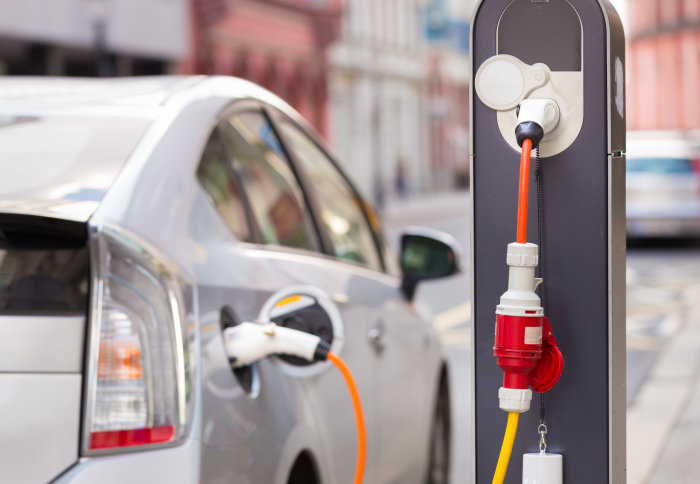Six new student startups go head to head in Venture Catalyst Challenge final

Breathe Battery Technologies is developing fast-charging batteries for electric vehicles
Six new science and technology startups founded by Imperial students are set to battle it out in the final of Imperial’s Venture Catalyst Challenge.
From music recommendations based on your emotions to new tools to tackle blindness, the teams represent some of the College’s most promising new businesses.
The Venture Catalyst Challenge (VCC), which is run by Imperial Enterprise Lab and powered by Blenheim Chalcot, is the College’s biggest entrepreneurial competition for students. It challenges them to turn their ideas into new technologies, products and businesses based around five key tracks:
- Digital, Consumer & Fintech - sponsored by Legal and General
- Energy & Environment - sponsored by Shell
- Health & Wellbeing - sponsored by P&G Ventures
- Robotics & AI - sponsored by Amazon Robotics
- Social Impact - sponsored by Imperial College London
After seven weeks of intensive masterclasses and coaching, the teams are getting ready to pitch in front of a live audience for a top prize of £30,000 funding on Thursday 21 March.
The final takes place during Enterprise Month 2019, a month-long showcase of startups, entrepreneurs, and innovators running throughout March.
Ben Mumby Croft, Director of Imperial Enterprise Lab, said: “This year’s VCC has broken new ground, not only in terms of the record number of entries but also in terms of quality. We look forward to showcasing the top 6 ideas at Thursday night’s grand final event and celebrating another exceptional year for student innovators and entrepreneurs at Imperial.”
If you would like to see the six finalists pitch at Thursday’s Grand Final, please register here.
Digital, Consumer & Fintech: AI medical education

SOCRATES, developed by medical students Luke Geoghegan, Christian Eichhorn, and Utsav Tiwary, are aiming to improve medical education through a new AI learning tool.
SOCRATES is a medical education assistant that allows students to develop consultation, diagnostic and clinical reasoning skills outside of a hospital setting. The team are hoping their tool will empower medical students to become better doctors.
Users are asked to diagnose virtual patients, which are developed using anonymised patient data, and SOCRATES provides feedback across a range of metrics including consultation proficiency, safety, knowledge and empathy.
Energy & Environment: In pursuit of clean air

Breathe Battery Technologies, founded by Mechanical Engineering postgraduate students Ian Campbell and Yan Zhao, is developing fast-charging batteries for electric vehicles.
Electric cars could help reduce harmful air pollution from exhaust emissions. However, currently recharging the battery of an electric car can take many hours. This means that many drivers consider them inconvenient or unsuitable for long trips
Breathe Battery Technologies is developing the technologies to make batteries charge faster, using state-of-the-art control software that adapts the charge to every battery’s unique condition. The company’s ultimate goal is that electric car charging takes only as long as drawing a breath.
Health & Wellbeing: making avoidable blindness a thing of the past

Medical students Simon Rabinowicz and Uddhav Vaghela who have founded VUI Diagnostics, are developing a device which would help doctors detect retinal diseases earlier to prevent avoidable blindness.
1.3 billion people suffer from visual impairment or blindness worldwide, of which 80% could still have intact vision through early diagnosis, the team say. Imaging the retina can diagnose over 50 eye and whole body diseases - including glaucoma and diabetes - but current tools are complex, slow and expensive – meaning they are unavailable to many patients.
VUI Diagnostics are developing a device that will make retinal imaging affordable, easier and faster, to help tackle avoidable blindness across the world.
Robotics & AI: user-friendly prosthetics

Irene Mendez Guerra (Bioengineering) and Ben Lakey (Dyson School of Design Engineering) have founded Naviga, which is developing intuitive, user friendly controls for prostheses.
The team say that current prostheses on the market are non-intuitive and require extensive training to use. This frustrates users and 40% end up abandoning them.
Naviga’s novel controller eliminates the long training sessions required to tailor the system to the user. Thus, they aim to increase the acceptance, usage and functionality of prostheses.
Social impact: tackling parasitic infections

Capta, founded by postgraduate students Laura Braun (Civil and Environmental Engineering) and Kai Riemer (Bioengineering) are developing a low-cost, handheld microscope that can connect to smart devices to facilitate earlier diagnosis of parasitic worms.
Parasitic worms affect 1.7 billion people globally, largely in the world’s poorest communities, causing malnutrition, pain and physical impairment. Early diagnosis and treatment can prevent illness, but current diagnostic tools are labour intensive and require expensive microscopes, which are often unavailable in the areas where parasitic worms are most prevalent.
Capta are developing an AI powered diagnostic tool that can instantly detect the type of parasitic infection and its severity to allow for appropriate and timely treatment. The instrument would also use this data to provide statistics about disease prevalence, allowing for more target drug delivery in the future.
Wildcard (Digital, Consumer & Fintech): Music tailored to your emotions

Alex McKeeman and Shaan Bassi, from the Department of Life Sciences, are the founders of Mind2Matter, a startup developing sensors that can understand a person’s emotions.
They are hoping to initially use their technology to improve the user experience of music streaming sites like Spotify, by allowing them to receive tailored music recommendations based on their current state of mind.
Article text (excluding photos or graphics) © Imperial College London.
Photos and graphics subject to third party copyright used with permission or © Imperial College London.
Reporter
Deborah Evanson
Communications Division